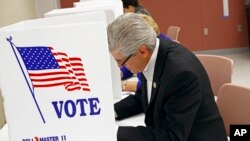Tuesday's elections in the United States did not carry the gravity of the 2016 races that will include choosing the country's next president, but Republicans still scored important victories in state contests.
In Kentucky, voters elected just their second Republican governor in the past 40 years as businessman Matt Bevin used a campaign against President Barack Obama's healthcare program to defeat Attorney General Jack Conway.
Meanwhile, Mississippi's Republican Governor Phil Bryant easily won another term. The only other state with a gubernatorial election this year is Louisiana, which will hold its contest later this month to replace Republican Bobby Jindal. A Democrat is favored in that race, meaning in 2016 the U.S. will likely have among its 50 states 31 Republican governors, 17 Democrats and one independent.
Low voter turnout
Odd-year elections draw far fewer people to the polls than turn out in even years, when all members of the House of Representatives and a third of the Senate are up for re-election. The larger turnout in 2016 will also affect state races with 11 holding elections for governor, including seven states currently led by Democrats.
Voters on Tuesday also got their say on social issues in their states and cities. In Houston, the largest city in the state of Texas and fourth largest in the country, an equal rights initiative to ban discrimination based on sexual orientation or gender identity failed with about 60 percent of voters opposing it.
Marijuana
Residents in the state of Ohio were asked if they wanted to legalize marijuana for both personal and medical use. But the measure had a controversial stipulation that called for all of the marijuana to be grown by a specific group of farms, drawing complaints that it created an unfair and unnecessary monopoly to benefit the growers. Voters rejected the proposal by a margin of about 64 percent to 34 percent.
Recreational marijuana is legal in the states of Colorado, Washington, Oregon and Alaska, as well as in the nation's capital, Washington, D.C. Medicinal marijuana is also legal in about half of states.
Colorado voters chose in 2012 to allow people to buy marijuana and later for the state to collect taxes on those sales. But the law says that if the state's other revenues come in higher than expected in a given year, then voters get to decide whether to let the state keep the marijuana taxes or refund them. On Tuesday, they chose to allow the government to spend $66 million, mostly to build new schools, instead of getting refunds.
Rental properties, endangered species
San Francisco voters rejected a proposed measure that would have kept owners who rent out a house or apartment for a few nights or weeks, such as those using the website Airbnb, from listing their property after it had been rented out for 75 nights in a given year. The aim was to "prohibit converting rental units from residential use to tourist use" in the city that has a shortage of housing and some of the highest rents in the nation.
In Washington state, voters enacted a new ban to combat trafficking of endangered species. The measure makes it illegal to buy, sell or trade parts or products made from any type of elephant, rhinoceros, tiger, lion, leopard, cheetah, pangolin, marine turtle, shark or ray that has been identified by international conservation organizations as under threat of extinction.


